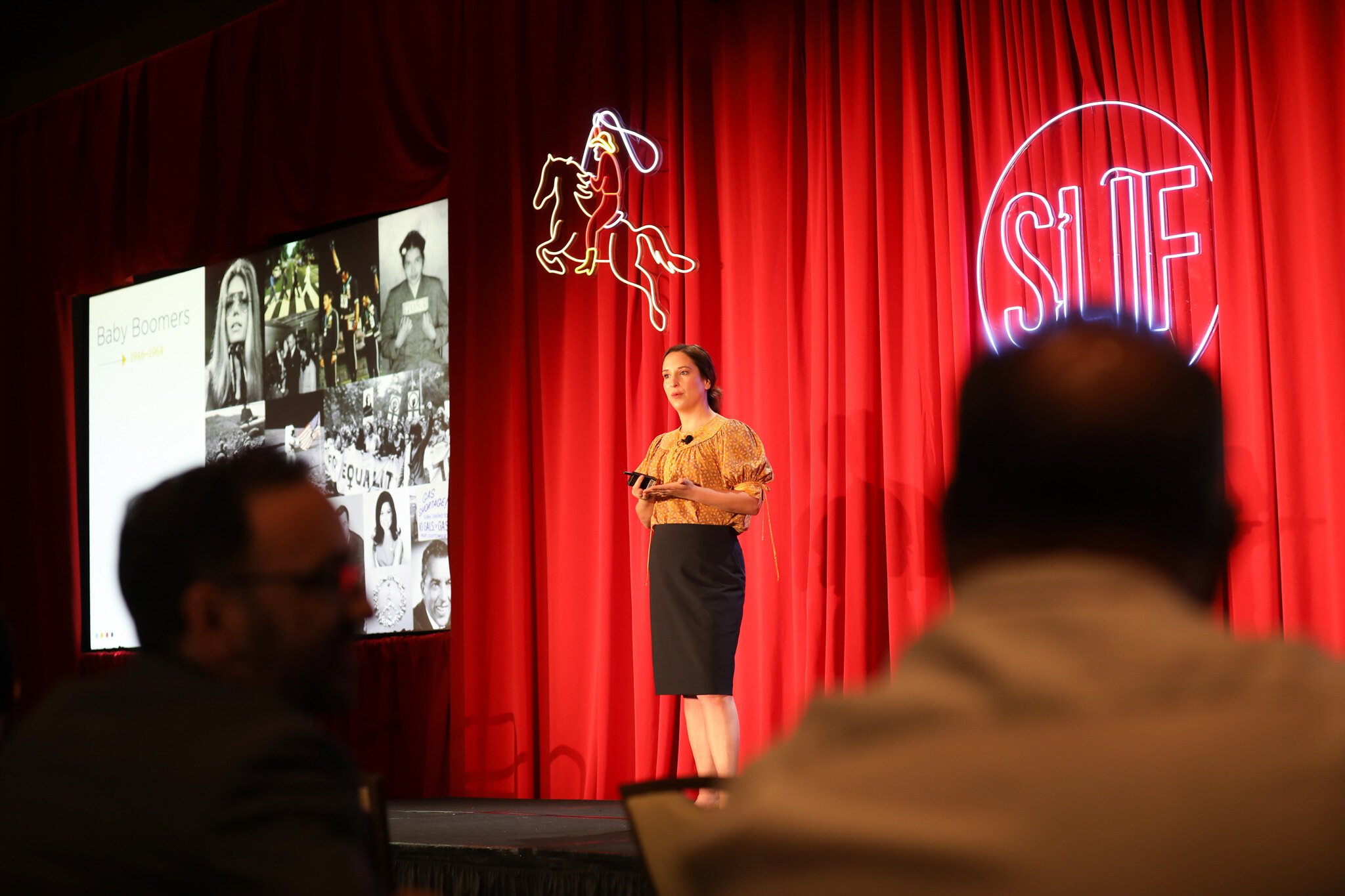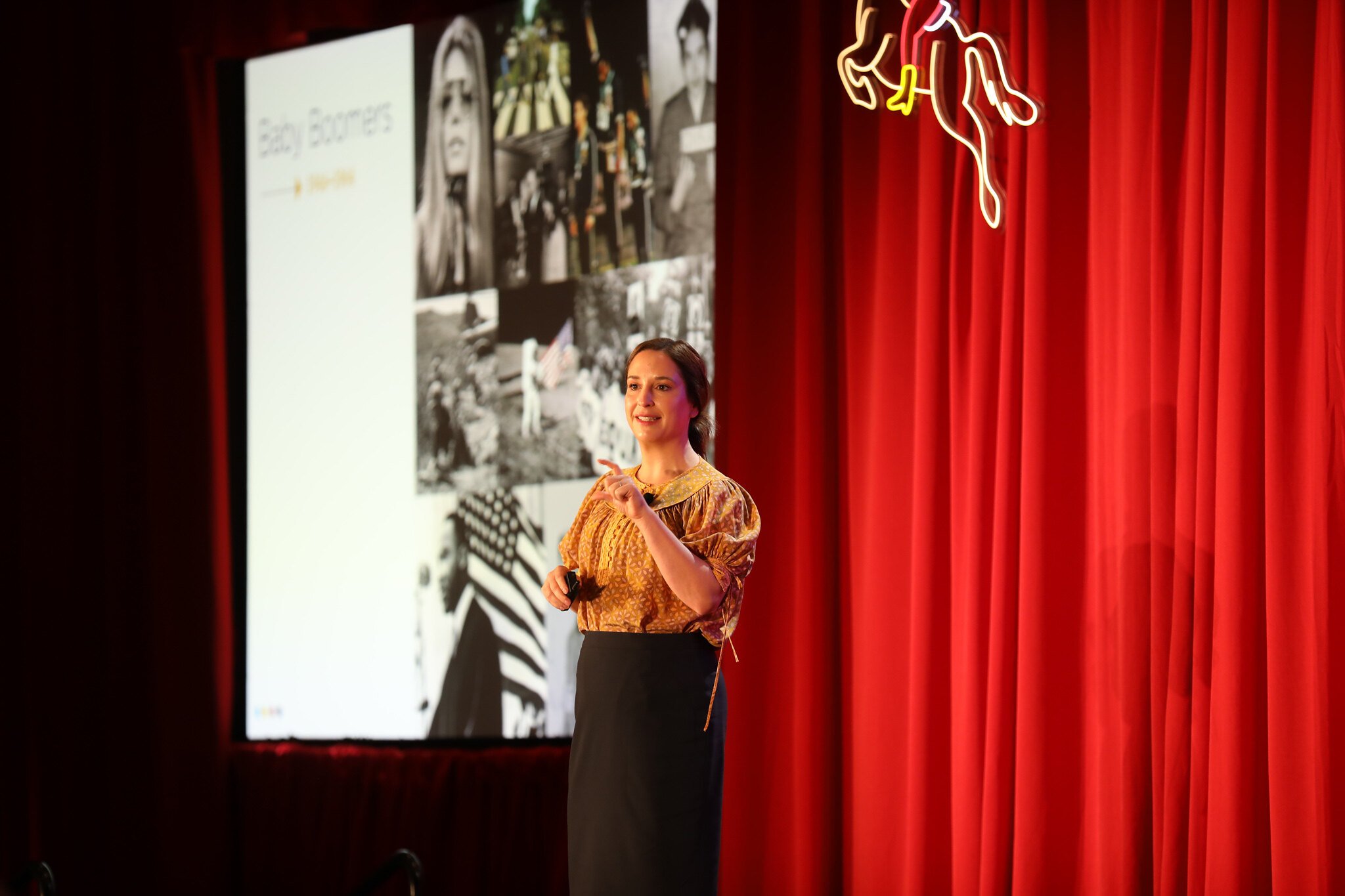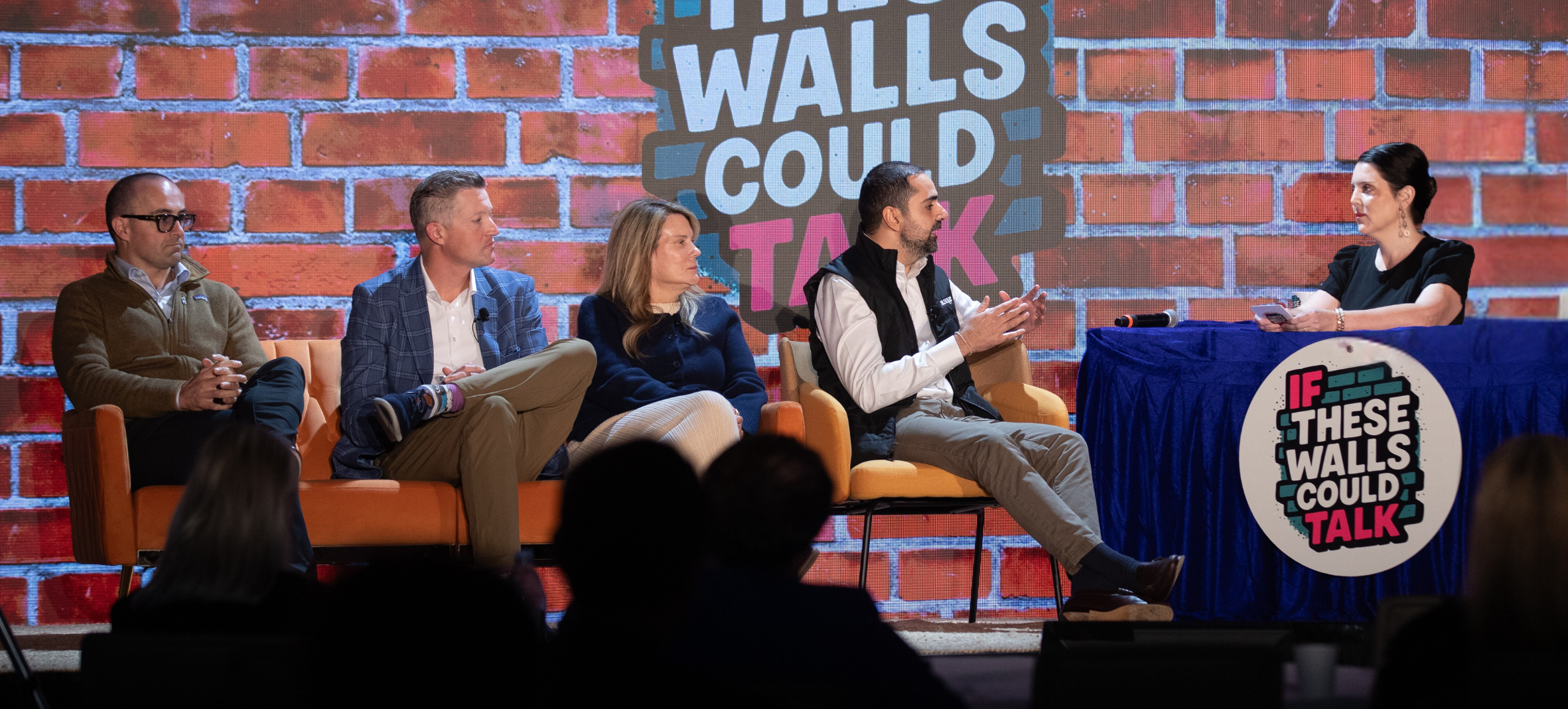The so-called Great Resignation of 2021 and 2022 had dire ramifications for senior living and many other industries, but it was not quite the apocalypse it’s been made out to be. In fact, it was in many respects a natural course of events: despite popular narratives about 22-year-olds quitting their barista jobs, recent data from Goldman Sachs indicates that roughly half of the workers who resigned were 55 years or older. In other words, the Great Resignation was really a Great Retirement.
According to generational expert Kim Lear, this is important to recognize because it reveals how the workforce crisis is an eminently solvable problem. “There are places where we can move the needle,” she argued in a presentation at the Senior Living Innovation Forum. “There are different ways that we can bring people in.”
As with so much else, the solution is simple: you just have to know your audience. Drawing on her research, Lear unpacked some of the defining characteristics of Baby Boomers, Gen X, Millennials, and Gen Z, offering a few strategies the senior living industry can use to recruit from each.
Why Baby Boomers Want out of Work
While Boomers may have driven the Great Resignation, Lear’s research suggests they may not be totally ready to leave the workforce. As the new trend of “encore careers” shows, Boomers are eager to keep working—so long as that work’s meaningful.
This provides a golden opportunity for senior living providers, though it requires a nuanced approach. As Lear pointed out, Boomer men have a very different relationship with work than Boomer women. For men, work and identity are “inextricably tied,” and retirement poses crisis-inspiring existential questions: “If I’m not my job,” Lear put it, “who am I?”
For women, retirement presents a chance to rediscover oneself; Lear described it as a blossoming. “Before the pandemic, Baby Boomer women were spending an unprecedented amount of money on things like travel and higher education, going back and taking classes,” she said, citing research she did for Moody’s Analytics. “They would say things to me like, ‘My whole life was burdened with so many expectations about how to look, how to nurture, how to work. For the first time, it kind of feels like no one's looking.’”
Then there’s the other crucial factor influencing Boomers’ post-retirement endeavors: they don’t want the same experience their parents had after leaving the workforce, which for many of them played out as a very rapid decline.
What these trends offer is a chance for the senior living industry to tap into a real hunger for meaningful work. Boomers may not be interested in full-time jobs, but Lear argued they’re unquestionably interested in doing something new and fulfilling. “There are a lot of people who are aging now who understand that to be completely disengaged with the type of stimulation provided by work is not what they want—but they don't want to stay in their current situation,” she said. “There's a place to offer something different: that stimulation, that sense of connection, that sense of community inside the workforce.”

Gen X’s Independent, Entrepreneurial Nature
Gen X poses a somewhat different set of challenges. Having grown up in the era of 24-hour TV, rising divorce rates, dual-income households, and omnipresent advertising, members of this generation are fiercely independent and highly skeptical. It’s very easy to lose their trust; it’s not nearly so easy to regain it.
At the same time, these traits have translated to high levels of entrepreneurship. “Fifty-five percent of startup founders belong to the Gen X category,” Lear said. “That makes sense: we've got a generation of kids who don't really trust the system. They taught themselves how to work outside of it.”
The rise of Gen X in the workplace (where the average C-suite exec is 56) has led to new styles of communication. “As Gen X-ers started moving into higher positions, this is when we started to see these trends of radical candor, hyper transparency, which are really a result of some of those underlying skeptical tendencies,” she explained. “It created this fairly specific style of communication. Honest, direct, unfiltered.”
Like Baby Boomers, Gen X-ers have also been shaped by their relationships with their parents—or, more specifically, by their struggles to be good children to their parents and good parents to their children. “If there’s one gift you can give people in their life stage, it’s the gift of their time back,” Lear said. For senior living providers, that means flexibility in scheduling and an understanding of what Gen X-ers are going through: “having some real empathy for this type of domestic and professional balancing act.”
Millennials: Influencing and Being Influenced
Millennials, Lear argued, are defined by two conditions: the rise of new technology (especially social media), and the experience of violence.
It may seem quaint in retrospect, but the social media landscape Millennials grew up with was markedly different than the one we have today. “Users were too young to know they were for sale, so there was really no conversation around the attention economy and data privacy,” Lear said. “These platforms could really serve as a haven for the youth experience. There was this explosion of creativity, particularly from creators of color who could bypass traditional gatekeepers and build their own audiences.”
The result was an era of “techno-democratic optimism” in which the Arab Spring and the Occupy movement emerged in the same year. Both reflected the “collective voice” Millennials found online, a new and powerful way of influencing culture and politics. “That ability to influence and be influenced is still a key piece that we look at with millennials,” Lear said, citing workplace transparency platform Glassdoor as an example of how this trend shaped the way Millennials engage with employers—and how employers have to engage with them.
Meanwhile, the horrifying experience of violence in schools gave rise to various pedagogical support mechanisms—most importantly, guidance counselors—that in turn contributed to a new sense that Millennials mattered. The system was willing to work with them, urging them to speak up and make themselves heard. Outside of schools, Millennials could find similar encouragement from religious leaders, athletic leaders, and, most importantly, their parents, who wanted to forge relationships with their kids that they didn't have with their parents. “America very quickly shifted from a culture where children should be seen and not heard,” Lear explained, “to a culture that put a premium on youth voices.”
By 2018, meanwhile, the majority of households were dual-income, with women contributing more financially and men contributing more domestically. This gave married workers greater freedom to quit their jobs and look for more suitable employment without sacrificing their families’ well-being. “This really changes some of those retention dynamics in the workplace,” Lear said.
The effect isn’t just that employers have to do more to attract and keep employees. As men have taken more and more responsibility for domestic work, we’ve also seen an evolving cultural understanding of who can be a caregiver—and a new focus on how employers can solve their workforce problems by giving employees the flexibility they need to lead rich lives outside the office.
“This whole conversation around work-life balance, flexibility—these have always been topics within the workplace, but traditionally we put them into this box labeled ‘women's issues’ and kind of push them to the side,” Lear argued. “One of the reasons this is at the heart of proper recruitment and retention today is because so many more men are involved in that conversation.”

Gen Z and the “Unceremonious Catapult into Adulthood”
When it comes to attracting Gen Z workers, few things are as important as building a diverse workplace. “About 76% of baby boomers are white, and for Gen Z that's about 50%,” Lear said. “Organizations that are not inclusive, they genuinely can't compete for talent with the ones that are.”
She also stressed the need to be mindful of the pandemic's psychological impacts, which she called an “unceremonious catapult into adulthood.” Her research into Millennials found that they tended to develop proper workplace development skills through their early dating experiences, something that Gen Z is a bit behind on (to say nothing of the effects of remote schooling). The employers that successfully recruit members of this generation, she suggested, will be the ones with empathy—the ones who understand that these communication struggles are not intrinsic personality flaws, but a devastating side effect of the last few years.
“Strong leaders for the next five years are going to have to help young people put their ideas in the right wrapping paper,” Lear said. “Good people and good ideas fall through the cracks all the time because of these miscommunications, and it's gonna be more prevalent over the next few years.”

“A Critical Moment”
As she wrapped up her presentation, Lear argued that the senior living industry should look at its workforce challenge not as an obstacle, but as a chance to optimize for success. “It's an opportunity for organizations to revisit their processes, procedures and norms, and really try to figure out how we make them more perfect, useful, and effective,” she concluded. “It’s not about right or wrong or better or worse; each generation brings something unique into the workplace. Now is a critical moment for strong leaders to leverage that.”

Posted by
SLIF heads to Carlsbad!
The One of a Kind Retreat for Senior Housing Leaders.
May 31 - June 2, 2026 | Carlsbad, CA
Learn More

.png)







Comments